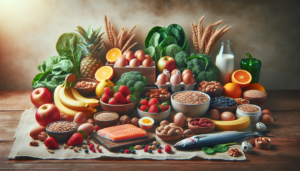Power Foods for Endurance Athletes
Understanding Power Foods for Endurance Athletes
Endurance athletes require specialized nutrition to support their prolonged physical exertion. The right foods can enhance stamina, optimize performance, and aid recovery. This article offers an in-depth exploration of key power foods that can significantly benefit endurance athletes.
Key Nutritional Needs for Endurance Athletes
-
Carbohydrates: The primary fuel source for endurance activities. These should comprise 60-70% of an athlete’s diet, focusing on complex carbohydrates for sustained energy release.
-
Proteins: Essential for muscle repair and recovery. Endurance athletes should aim for 1.2 to 1.4 grams of protein per kilogram of body weight daily.
-
Healthy Fats: Necessary for long-duration energy, particularly when glycogen stores are depleted. Fats can make up 20-35% of an athlete’s caloric intake.
- Vitamins and Minerals: Important for energy production and immune function, particularly during intense training cycles.
Top Power Foods for Endurance Athletes
1. Whole Grains
-
Quinoa: High in protein and all essential amino acids, quinoa also provides fiber and minerals, which helps with digestion and energy maintenance.
-
Brown Rice: Offers complex carbohydrates and is rich in B vitamins, which play a vital role in energy metabolism.
- Oats: A great source of slow-releasing carbohydrates, they help maintain blood sugar levels during prolonged exercise.
2. Fruits
-
Bananas: Often referred to as the go-to snack for athletes, bananas are rich in potassium, which helps prevent muscle cramps and aids in recovery.
-
Berries: Packed with antioxidants, berries such as blueberries and strawberries reduce inflammation and oxidative stress, a common occurrence in endurance training.
- Oranges: Rich in vitamin C and sugars, oranges replenish glycogen stores and support hydration.
3. Vegetables
-
Sweet Potatoes: Loaded with carbohydrates, beta-carotene, and vitamins B6 and C, sweet potatoes are essential for energy and immune support.
-
Spinach: High in iron, spinach helps enhance oxygen transport in the blood, crucial for endurance activities.
- Broccoli: Contains fiber and a variety of essential vitamins and minerals, helping to combat oxidative stress.
4. Legumes
-
Lentils: An excellent source of plant-based protein and fiber, lentils support muscle recovery and digestive health.
-
Chickpeas: Rich in carbohydrates and protein, chickpeas are versatile and can be added to salads, soups, and stews.
- Black Beans: High in protein and antioxidants, black beans provide sustained energy for extended workouts.
5. Nuts and Seeds
-
Almonds: A great source of healthy fats, protein, and vitamin E, almonds help combat muscle soreness post-exercise.
-
Chia Seeds: High in omega-3 fatty acids and fiber, chia seeds improve endurance through better hydration and nutrient absorption.
- Walnuts: Packed with omega-3 fatty acids, walnuts assist in reducing inflammation and supporting heart health.
6. Dairy and Dairy Alternatives
-
Greek Yogurt: High in protein and probiotics, Greek yogurt supports muscle recovery and gut health.
-
Cottage Cheese: Offers casein protein, which digests slowly, making it ideal for post-workout recovery.
- Almond Milk: A good low-cal alternative to cow’s milk, fortified versions provide calcium and vitamin D without added sugar.
7. Lean Proteins
-
Chicken Breast: A lean source of protein that aids muscle repair and can be easily incorporated into various dishes.
-
Fish (Salmon and Tuna): Rich in omega-3 fatty acids, essential for reducing inflammation and aiding recovery.
- Eggs: Packed with high-quality protein and vital nutrients, eggs are versatile and easily digestible.
8. Healthy Fats
-
Avocados: Full of heart-healthy monounsaturated fats, avocados provide essential nutrients like potassium and vitamin E.
-
Olive Oil: A staple in Mediterranean diets, olive oil contains anti-inflammatory compounds that benefit endurance performance.
- Nut Butters: Natural nut butters provide healthy fats and proteins, ideal for pre- or post-exercise snacks.
9. Hydration and Performance Drinks
-
Coconut Water: An excellent natural electrolyte source that aids hydration post-exercise.
-
Sports Drinks: Formulated to replenish electrolytes and carbohydrates lost during intense training, aiding recovery.
- Homemade Electrolyte Drinks: Combining water, salt, and natural sugars can help maintain hydration levels.
Meal Ideas for Endurance Training
Breakfast
-
Oatmeal topped with Almond Butter and Bananas: This power-packed breakfast is rich in carbohydrates, healthy fats, and potassium.
- Greek Yogurt Parfait with Berries and Chia Seeds: A balanced meal that provides protein, antioxidants, and fiber.
Lunch
-
Quinoa Salad with Chickpeas, Spinach, and Olive Oil: A nutrient-dense meal high in protein and healthy fats.
- Whole Wheat Wrap with Grilled Chicken, Avocado, and Vegetables: A satisfying lunch option rich in lean protein and healthy fats.
Dinner
-
Baked Salmon with Sweet Potatoes and Broccoli: A wholesome dinner providing protein, complex carbohydrates, and essential vitamins and minerals.
- Stir-Fried Tofu with Mixed Vegetables and Brown Rice: A delicious plant-based option full of protein and fiber.
Snacks
-
Fruit Smoothie with Spinach and Chia Seeds: A quick nutrient boost before or after workouts.
- Trail Mix with Nuts, Seeds, and Dark Chocolate: A high-energy snack that satisfies hunger and provides healthy fats.
Timing and Balance
Proper timing and balance of nutrient intake are crucial for endurance athletes. Here are some tips:
-
Pre-Workout: Focus on easily digestible carbohydrates with some protein for energy. Aim to eat 30-90 minutes before training.
-
During Exercise: For exercises lasting more than an hour, consider consuming easily digestible carbs, like gels or bananas, every 30-45 minutes to maintain energy levels.
- Post-Workout: A combination of carbohydrates and protein should be consumed within 30 minutes post-exercise to optimize recovery.
The Importance of Variety
Incorporating a diverse array of foods ensures that athletes receive a broad spectrum of nutrients necessary for optimal performance. Rotating power foods regularly helps prevent dietary boredom and enhances micronutrient intake.
Supplements and Considerations
While whole foods should always be the foundation of an athlete’s diet, some supplements may offer additional benefits:
-
Protein Powders: Convenient for quick protein intake when needed.
-
Electrolyte Supplements: Useful during prolonged sessions to help maintain hydration.
- Omega-3 Fatty Acids: May aid in reducing inflammation and improving recovery.
Always consult a healthcare professional or registered dietitian before integrating new supplements, especially if dietary restrictions or health concerns exist.
Conclusion on the Importance of Nutrition for Endurance Success
Endurance athletes must focus on consuming power foods that provide adequate energy, support recovery, and enhance performance. By prioritizing nutrient-dense whole foods and maintaining a balanced diet, athletes can optimize their training. Consistent adherence to these nutritional strategies can lead to improved results and greater enjoyment of the sport. Following these guidelines, endurance athletes can fuel their passion for performance and ensure longevity in their athletic careers.








